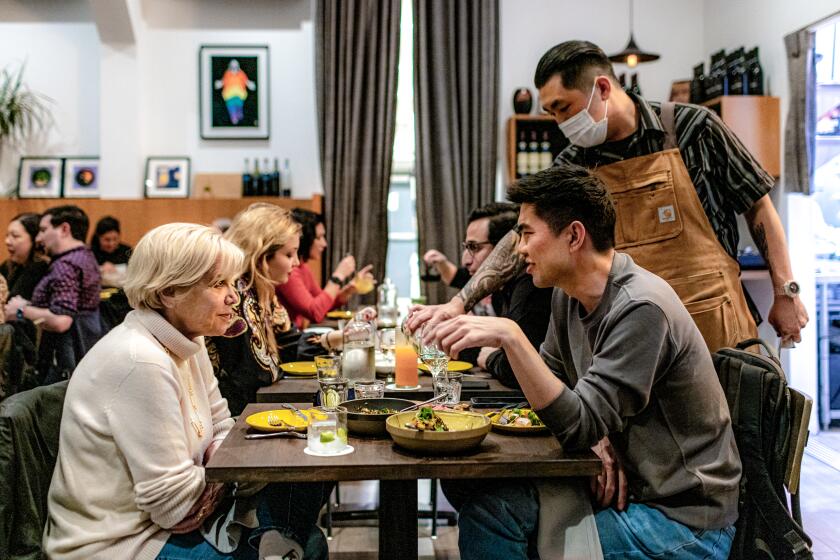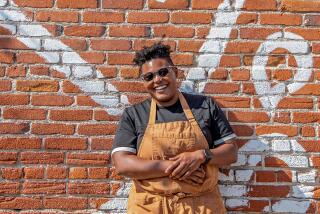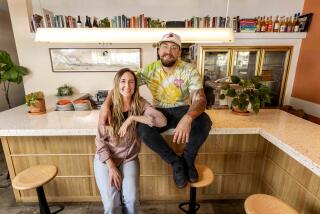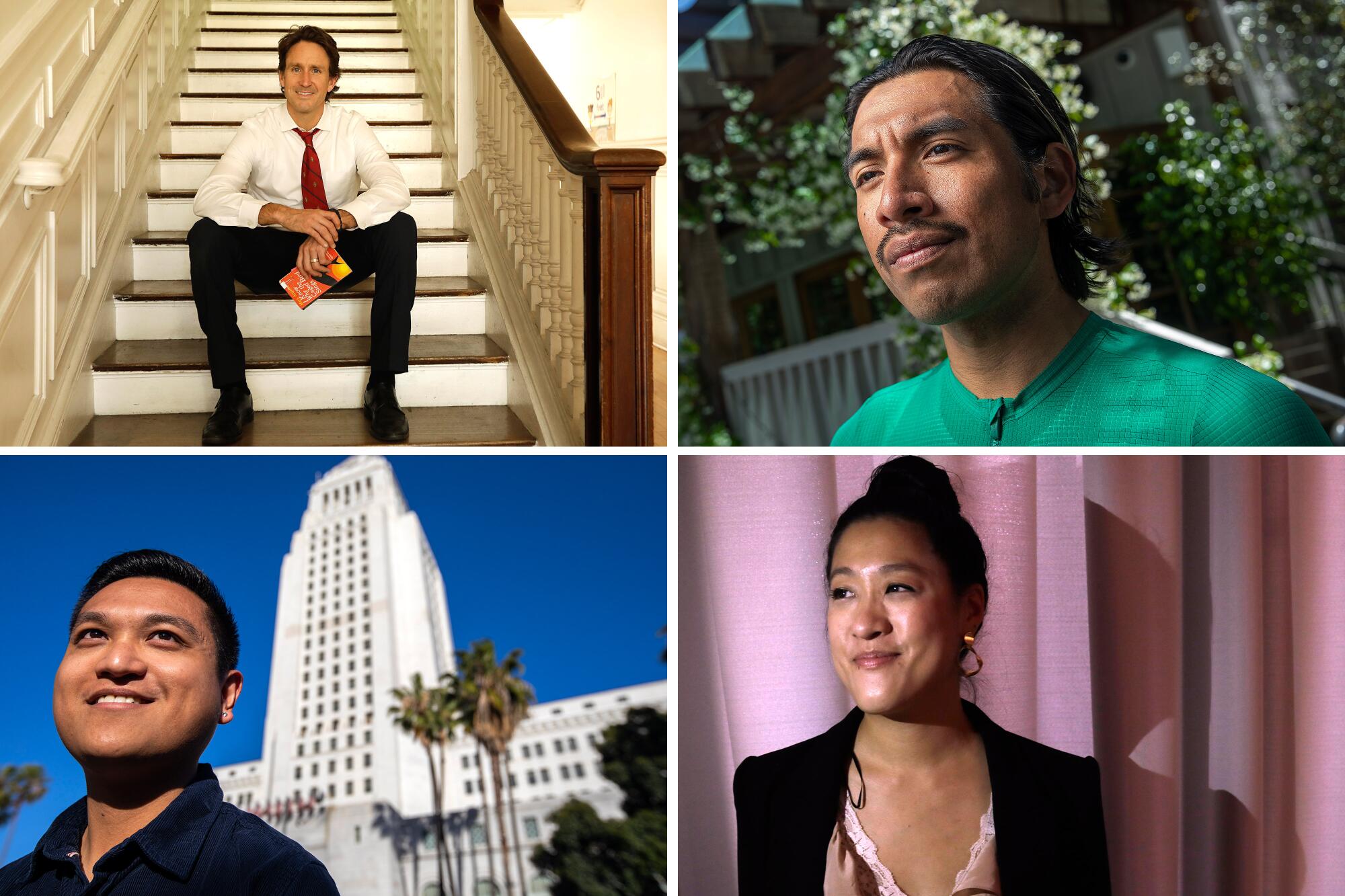
A bar director in the restaurant business for three decades quit after a customer spat on her mask.
A server seeking stability for his family found a new job as a high school English teacher.
A chef who thought he had reached “life fulfillment” at a luxurious restaurant later found an unexpected upside in office work.
These workers left restaurant and bar jobs as the pandemic forced a hard reset across industries, hitting the restaurant business particularly hard.
Mom-and-pop shops that make up a majority of the industry were vulnerable to the extreme instability of COVID-19 shutdowns and re-openings. Restaurants that were able to reopen came under new threats, including rising prices and workers unable or unwilling to come back to work.
Returning workers — such as chefs, managers, short-order cooks and servers — faced the daily dissonance of being hailed by some as part of the “essential” workforce — while being spat on or cursed at by others, overworked and — in many cases — laid off.
In March 2020 alone, restaurants and bars nationally shed 5 million jobs. By the end of 2021, those businesses were still down 1.1 million jobs
Recovery is still far off. Restaurants are lagging other businesses and parts of the economy that have bounced back despite the enduring challenge of hiring across the board.
And though some restaurant workers feel more empowered to demand better pay and conditions, and some employers are responding, widespread changes and a clear plan to steer the industry from the wreckage of COVID-19 are yet to emerge, business owners and experts studying the industry said.
“There won’t be one solution that works,” said Bjorn Hanson, an adjunct faculty member at New York University’s Tisch Center of Hospitality who led research last summer on the challenges of recruiting workers back into hotel and restaurant jobs. “It will recover, but it will be a longer recovery.”
More pay, flexible schedules and better options for career advancement could draw people back, Hanson’s research shows. It included interviews with more than 100 hotel and restaurant employers.
To secure these changes, more restaurant employees are organizing and unionizing than in decades. “The policy is actually changing in response to workers,” said Saru Jayaraman, director of UC Berkeley’s Food Labor Research Center and president of One Fair Wage, a group that advocates for employers to pay workers their full minimum wage, plus tips.
“People in our industry are looking for good places to work. They want to work where they know they’ll be treated well, maybe where they’ll learn a little bit more, where they can grow,” said restaurant veteran Dina Samson, who raised the starting pay at Superfine Pizza, a takeout restaurant in downtown L.A. that she co-owns, to $20 an hour, not including tips, from the previous minimum of $18.
She was able to keep workers from leaving and hire new ones.
The Times interviewed longtime restaurant and bar workers about why they left their jobs during the pandemic and where they have since landed. All sought more flexibility and a less intense work schedule. Some have gravitated back to the industry they vowed to swear off, as many people continue to find their feet in a scrambled labor market.
Here are five personal stories.
‘I never want to go back to being in a restaurant five days a week’

Gaby Mlynarczyk started her bartending career in the United Kingdom in the 1980s as an 18-year-old college student looking to make extra money to buy clothes. After she moved to the U.S. in 1993, she continued working in bars and restaurants, first in New York and then in L.A.
“There’s an energy of working in a restaurant or a bar — it’s different every single day,” said Mlynarczyk, 55. “It can be a little bit of a grind at times, but you meet such amazing people working in restaurants and bars, and you learn so much about food and beverage.”
Mlynarczyk was working at a cafe-bar in Playa Vista when the pandemic hit, where she said she noticed customers were not tipping.
In the U.K., she said, restaurant workers are paid a “really good hourly wage,” and although you didn’t often get tips, you could make a living. (In 1992, she made about 18 pounds an hour, which comes out to about $23 an hour in today’s U.S. dollars). In the U.S., servers and bartenders are often paid minimum wage, with customer tips supplementing that income, she said.
“A lot of this is probably why many, many staff in Los Angeles quit their jobs because they realized that they were basically being exploited for no money,” Mlynarczyk said.
Los Angeles and Orange County restaurants are struggling to find staff, resulting in shortened hours, smaller menus, longer wait times, angry customers.
She made $75,000 in her last job as bar director of a pop-up in 2021, which came out to about $56,000 after taxes, she said. Her final straw came at that bar last summer, when a guest spat on her mask, she said.
Per state regulations, capacity was limited to about 25%. Hotel guests were infuriated they couldn’t get into an event one night, and it got unruly. Without enough security staff, Mlynarczyk had to act as bouncer, busser, bar director and general manager all at once.
“I got home that night, and I was just like, ‘That’s it. I can’t do this anymore,’” she said. “I never want to go back to being in a restaurant five days a week.”
Mlynarczyk now works with a Napa aperitif company as a brand ambassador who trains staff and promotes the product throughout Southern California. She said she loves having a boss who respects her opinions, makes more money now and is eligible for bonuses.
“Kids coming out of college or on summer vacations will take low-paying jobs ... just so they have a little extra pocket money,” she said. “But there are also people like myself that want to be in this industry as a career ... and would love to be able to afford to live on the salaries we’re given.”
‘It was the wakeup call that my whole life needed to change’
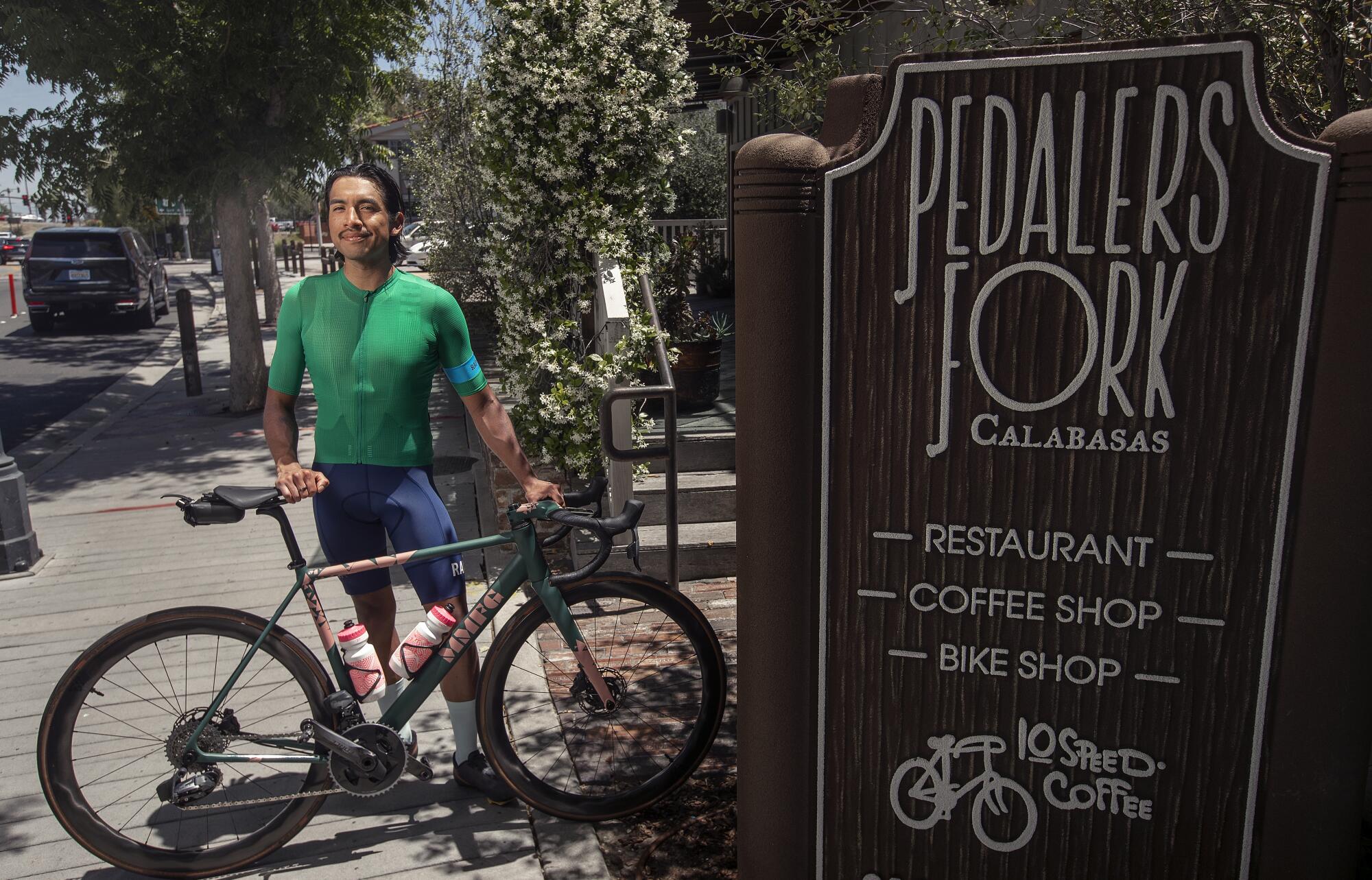
These days, Jesse Martinez’s life revolves around cycling.
Nearly every Friday morning, he bikes through the Santa Monica Mountains. During his workweek, he helps customers at Rapha road cycling and apparel store as a retail associate.
It’s a far cry from his previous life. Last June, Martinez lost his job as a beverage manager and assistant general manager when downtown L.A. bar and restaurant Barcito closed.
Martinez, 31, had worked in the restaurant industry since he was a college student in Bloomington, Ind. It was the only business he’d known, other than a brief stint working in public policy in Washington. He loved socializing with guests and learning about food and beverages.
“It was something I wanted to craft my future around,” said Martinez, an Encino resident. “Before the pandemic, I would have said, ‘Yes, I am fully in the hospitality industry.’”
When the pandemic forced Barcito to permanently shut, Martinez had time to reflect. “It was the wake-up call that my whole life needed to change,” he said.
He was one year sober and had started cycling more seriously — two parts of his life that would become increasingly intertwined, and the pandemic offered the right moment.
“Cycling is the process of constantly reinventing yourself and taking a break to pause when it gets a little tough and finding the energy to try to do it again,” he said. “When I became sober, it was like a deep philosophical marriage. I don’t have to do sobriety perfectly, I don’t have to do cycling perfectly.”
He took a part-time job as a retail associate at Rapha’s Santa Monica store, while also working at Pedalers Fork, a restaurant and bike shop in Calabasas. When Rapha offered him a full-time job, he quit the restaurant work.
In June, he’ll celebrate two years of sobriety. “It’s been a re-orientation of perspective,” Martinez said of his career pivot. “It’s something that’s a little more long-term sustainable.”
Everything he loved about the hospitality industry — meeting guests, helping people — has segued nicely to his retail role, he said.
“The more focused I’ve become the past six months, it’s just made it easier for me to know what I want in life and what I want to cut out,” Martinez said.
‘I hope to make effective change from within’

For 13 ½ years in restaurant and bar jobs, Karen Fu worked many 10- to 12-hour days, in constant “on” mode to manage staff and guests.
She worked the long shifts on her feet through recurring ankle injuries.
When she was furloughed from her bartending job at the start of the pandemic, she got an unexpected moment to rest. Her personal time became something she cherished.
The bar director at her company asked Fu to return to her job as a bartender, twice. She said no.
“It was a tough decision, absolutely, and I acknowledged being lucky enough to receive unemployment compensation at the time, like many others,” said Fu, 38, an Echo Park resident. “But just the idea of putting personal health and welfare at risk when I had already felt that the weight and burden of sacrifice I’ve made in the past from a career in hospitality ... (I) was aware of that.”
She returned to work about a month and a half before outdoor dining was shut down again in November 2020, then declined to come back after that.
She took up volunteer work for the Restaurant Workers’ Community Foundation advocacy group, where she is now co-chair of the organization’s grant-writing and nonprofit partnerships committee and was voted onto the board of directors.
Fu said she “found that work more viable and productive in terms of giving back to the industry that I do love and enjoy being a part of.” And although it has been gratifying to see more companies raise wages and improve benefits, she said, “I do think we have a ways to go.”
Fu hoped to find a job in nonprofit work but didn’t get traction. Last month, a longtime acquaintance approached her with a job offer to manage bar operations in a Beverly Hills hotel.
It brought Fu back to the industry she thought she was done with. But in this new management position, she has a salaried job — unlike her previous hourly roles — with better pay, a more balanced schedule and health benefits.
“It has felt right, it has felt good, and I hope to make effective change from within,” she said.
‘My job feels like it’s not going to be here tomorrow’
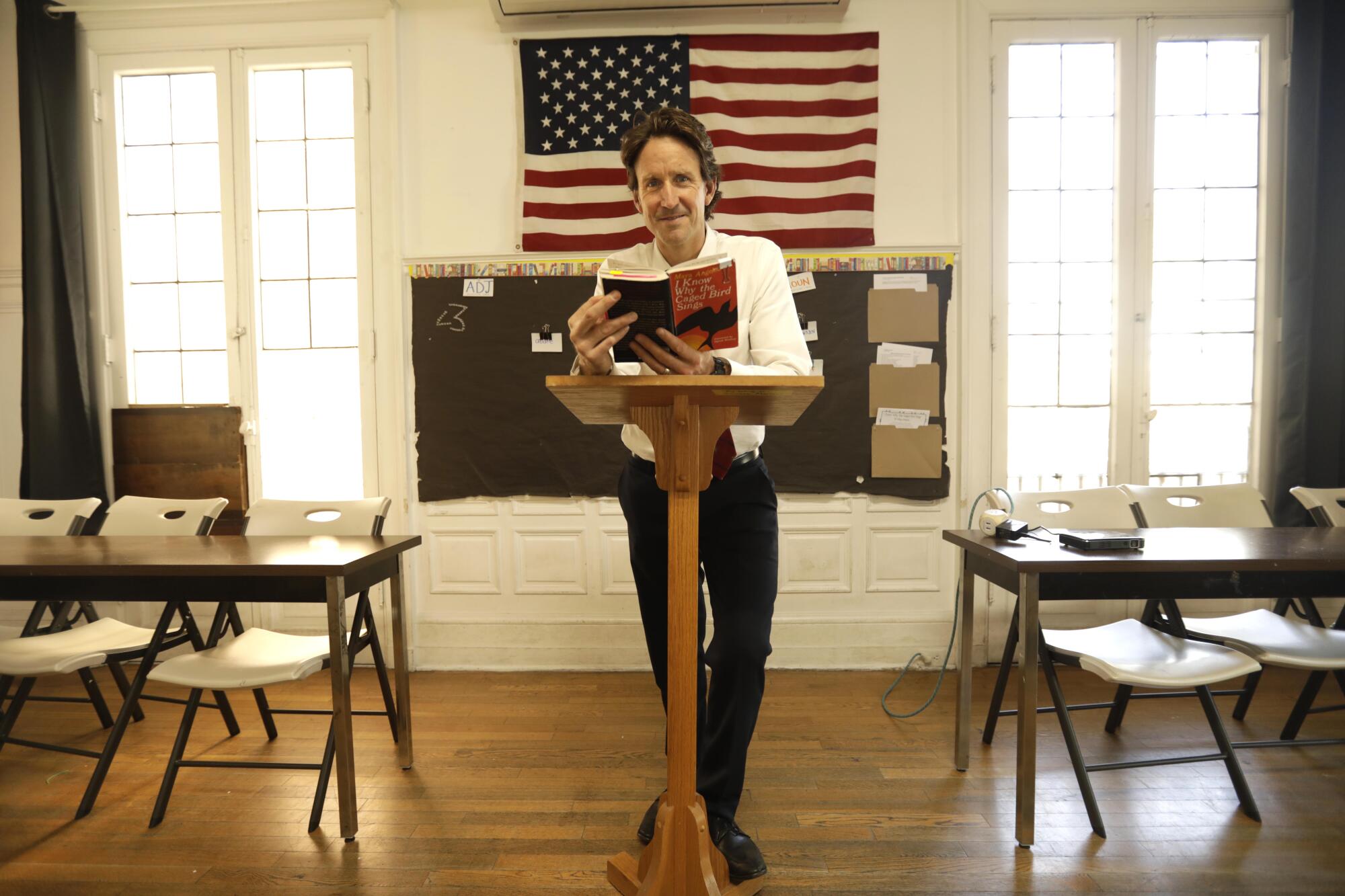
Schuyler Mastain, 39, started working as a waiter at famed downtown L.A. restaurant Rossoblu in 2018 as a way to support himself while he pursued a career in acting.
He loved his work and the restaurant’s management team, but after the pandemic hit and he got married, he wanted to “recession-proof” his life. In August, he quit his job and became a high school English teacher, for less pay.
“Restaurants feel volatile,” Mastain said. He remembers thinking: “My job feels like it’s not going to be here tomorrow. I need something where I can provide for a wife and hopefully, children.”
Teaching hasn’t been everything he hoped it would be, either. Mastain is relatively low on the pay scale because he has only four years of experience. He makes about $4,100 a month, compared with the $5,000 a month he made as a server as Rossoblu.
“My mind was thinking, ‘I need to get something I can count on and build on for the future,’” Mastain said as he sat in his car after a day of teaching in January, when half his class was out due to Omicron infections. He said he thought about going back to his server job.
People are leaving their jobs in droves in a pandemic trend now known as the Great Resignation. But what if you can’t quit? This guide’s for you.
He occasionally takes shifts at Rossoblu on an on-call basis and plans to work there full time during the summer to supplement his family’s income while school is out. In the fall, he’ll be teaching high school drama full time in the Los Angeles Unified School District.
Despite the lower pay, teaching has its perks. Mastain gets to see his family on Thanksgiving and Christmas, holidays that would be inconceivable in the restaurant business. He spends evenings with his wife.
Mastain remembers how customers were initially understanding of the extra responsibilities and delays the pandemic wrought on restaurant servers. But after a while, they expected things to go back to the way they were and weren’t shy about voicing it.
“I really felt like people didn’t see me,” he said. “They just saw the idea of ‘He’s supposed to get me my thing,’ and that was tough.”
‘If the pandemic had never happened, I would still be a part of it’

M.J. Mercado was in his his dream job five years into his career.
He helped open the upscale restaurant Somni, nestled in the SLS Hotel in Beverly Hills, in 2018 alongside a team of fellow chefs. It boasted an extensive tasting menu prepared in front of diners by the chefs, who also served and interacted with guests.
It was Mercado’s “life fulfillment event,” the culmination of years of training. He learned to cook at home, through his parents and television cooking shows, and went on to culinary school and then to work as a prep cook and line cook.
In 2019, Somni was awarded two Michelin stars. The next year, in March 2020, it temporarily shut down, like many restaurants. It closed for good later that summer.
“I was holding out hope that we were going to reopen,” said Mercado, 29. “We lived and breathed it, and to not be around it, it took a part of us away, essentially.”
The abrupt halt to a high-intensity, eight-year career forced Mercado to think about who he was outside of the kitchen. “This would be a good point in time for me to try something else or do something different,” he said he thought at the time.
He zeroed in on service — a desire to help others — and became interested in public policy after seeing how the city of L.A. tried to help service workers during the pandemic, he said. He enrolled at Santa Monica College, where he is taking classes toward a degree in political science.
To make money, he’s also working for a healthcare company that dispatches nurses to elderly patients’ homes. It’s a 9-to-5 job with weekends off — unheard of in his restaurant career — and he has a more stable idea of his income because of his set schedule. At his Michelin-starred job, he made $16 an hour not including overtime, which he often worked.
Mercado has thought about going back into the restaurant business, but as he looks forward, the long and erratic hours give him pause.
“I plan on having kids of my own,” he said. “I want to know that I can see them on the weekends, I can see them at night, I can be there for my family, and I think having an office job, it helps me do that.”
Times staff writer Thomas Suh Lauder contributed to this report.
More to Read
Inside the business of entertainment
The Wide Shot brings you news, analysis and insights on everything from streaming wars to production — and what it all means for the future.
You may occasionally receive promotional content from the Los Angeles Times.
